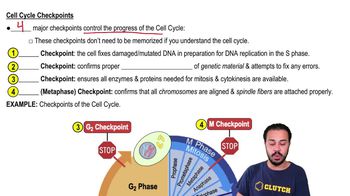Cell Cycle Regulation definitions Flashcards
 Back
BackCell Cycle Regulation definitions
1/15
Terms in this set (15)
- Cell CycleA series of phases that cells go through to divide and produce new cells, highly regulated by signals and checkpoints.
- Growth FactorsProteins that act as signals to promote cell division, ensuring cells divide only when necessary.
- CheckpointsRegulatory stop points in the cell cycle that ensure conditions are met before proceeding to the next phase.
- p53 ProteinA protein that repairs DNA errors or triggers apoptosis if errors are irreparable, preventing cancer.
- ApoptosisProgrammed cell death that prevents the accumulation of errors, crucial for maintaining healthy cell populations.
- G1 CheckpointEnsures DNA integrity before replication in the S phase, preventing the propagation of errors.
- S CheckpointConfirms proper DNA replication, ensuring genetic material is accurately duplicated.
- G2 CheckpointVerifies the presence of necessary enzymes and proteins for mitosis, ensuring readiness for cell division.
- M CheckpointEnsures correct chromosome alignment during metaphase, crucial for accurate cell division.
- MitosisA phase of the cell cycle where replicated chromosomes are separated into two new nuclei.
- CytokinesisThe process following mitosis where the cell cytoplasm divides, forming two daughter cells.
- Chromosome AlignmentThe arrangement of chromosomes at the cell's equator during metaphase, essential for proper division.
- Spindle FibersStructures that attach to chromosomes during cell division, ensuring their proper segregation.
- CancerA disease caused by unregulated cell cycle progression, often due to checkpoint failures.
- DNA ReplicationThe process of duplicating the cell's DNA, occurring during the S phase of the cell cycle.


